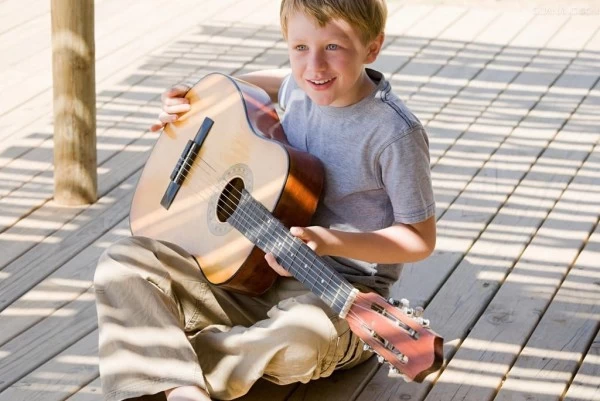10 Benefits of Children Learning a Musical Instrument
2018-05-14 16:46:37

Music therapy helps children heal from illnesses through both listening to and playing music.
Music therapy helps children heal from illnesses through both listening to and playing music.
As we explained before, “Music therapy can help to relieve pain and reduce stress and anxiety for the patient, resulting in physiological changes, including: improved respiration, lower blood pressure, improved cardiac output, reduced heart rate and relaxed muscle tension. This form of therapy has been shown to have a significant effect on a patient’s perceived effectiveness of treatment, including pain reduction, relaxation, respiration rate, and lower levels of anxiety.”
Music therapy also improves the mental challenges of being in a hospital that can include improving stress, anxiety, feeling overwhelmed, depression, social withdrawal and much more.
Starting Music Therapy
When a music therapist first meets with a patient, they assess their abilities and get to know them individually. The initial meeting is about getting to know the child: what are their specific needs, abilities, interests and behaviors? The therapist then creates a unique plan to help reach recovery milestones through listening to music, writing songs, singing and playing instruments. From there, the music therapist tracks and monitors the progress of the patient and child and makes any updates and changes to the goals as needed.
Not only does learning to play an instrument have a positive impact on the overall physical and mental wellbeing of a child in a hospital, there are a number of other benefits to learning how to play an instrument. Keep reading to learn more about these benefits; you may just want to pick up a flute or guitar for your child right now.
Benefits of Learning to Play a Musical Instrument
As reported by TIME, a study from Northwestern University revealed that in order to fully obtain the cognitive benefits of a music class, kids can’t just sit there and listen to music; they have to be actively engaged in the music and participate in the class. “Even in a group of highly motivated students, small variations in music engagement, attendance and class participation predicted the strength of neural processing after music training,” said Nina Kraus, director of Northwestern University’s Auditory Neuroscience Laboratory.
Since there is evidence and support that simply listening to music isn’t as effective, here are 11 more reasons from West Coast Music why children should learn to play instruments instead of just listening to them.
10 Reasons to Play an Instrument
Increases Memory Skills
Learning an instrument teaches a child how to create, store and retrieve memories more effectively. This video from TED-ED explains how playing an instrument is like a total workout for the brain. In a hospital, this keeps a child or teen’s brain working and can distract from their pain.
Teaches Perseverance and Creates a Sense of Achievement
Learning to play an instrument takes a lot of time, patience and practice. During music lessons and music therapy, a teacher or therapist will set short term and long term goals. As the child reaches their goals, they will feel a sense of achievement and pride.
Improves Coordination
Playing an instrument requires the brain to work at advanced speeds. Reading music is converted in the brain to the physical motion of playing the instrument. Those who play instruments have improved hand eye coordination over those who do not.
earning to play an instrument can help kids grow socially and academically.
Learning to play an instrument can help kids grow socially and academically.
Improves Math Skills
Playing an instrument may seem like a creative act, but there are many parallels to math. Music and math are highly intertwined. By understanding beat, rhythm and scales, children are learning how to divide, create fractions and recognize patterns. “It seems that music wires a child’s brain to help him better understand other areas of math,” says Lynn Kleiner, founder of Music Rhapsody in Redondo Beach, CA to Parents online.
Improves Reading and Comprehension Skills
Learning and playing music requires constant reading and understanding. Children and teens need to identify a note on the page and recognize which note (pitch) to play on their instrument, how long to hold it, what finger to use and how loudly to play it. They also need to identify if the note should be played short and crisp, or smooth and connected to the next note. Learning to read and comprehend music can even help in reading and understanding literature in school classes.
Creates Responsibility
Most instruments require some kind of maintenance or upkeep. This can be anything from oiling to tuning to cleaning. Encouraging children to stay on top of regular instrument maintenance creates a level of responsibility for them. When they are responsible for something they are more likely to take care of it themselves without a parent having to remind them.
Exposes the Student to Culture and History
Music theory has a deep history and can be taught as part of musical instruction. Music is most often a reflection of the culture and era it was composed in. Exposing a child to multiple types of musical genres (for example classical, contemporary, rock, jazz, blues, folk or medieval) will allow them to have a glimpse into the past. Understanding the origins of music, can give children a deeper understanding of what they are playing and they may become more attached to it.
Music therapy also has an interesting history including being found in Greek Mythology, philosophy, Native American culture, World War II and the United States military. Read more about it in our post about music therapy’s roots.
Nurtures Self-Expressions
Children learning to play an instrument are able to find themselves creatively. In fact, one of the amazing benefits of music therapy is the ability for children to express themselves. By learning how to express themselves and their complex feelings about their illness through music, they are able to find a way to show or play what they are feeling during their hospital stay.
Improves Listening Skills
Playing an instrument requires children listen carefully to an array of different things. They not only need to listen to instructions from their teacher or music therapist, they need to listen for rhythm, pitch and speed. This concentration will improve their skills in music and in life.
Improves Social Skills
Depending on what the music therapist decides, music therapy can be done either bedside or in group settings. When engaged in a group setting, this requires children and teens to work together to collaborate on a specific sound or song. Interacting with other kids will give them an opportunity to make friends and improve their time in the hospital. Additionally, it helps children outside of a hospital relate to their classmates.









